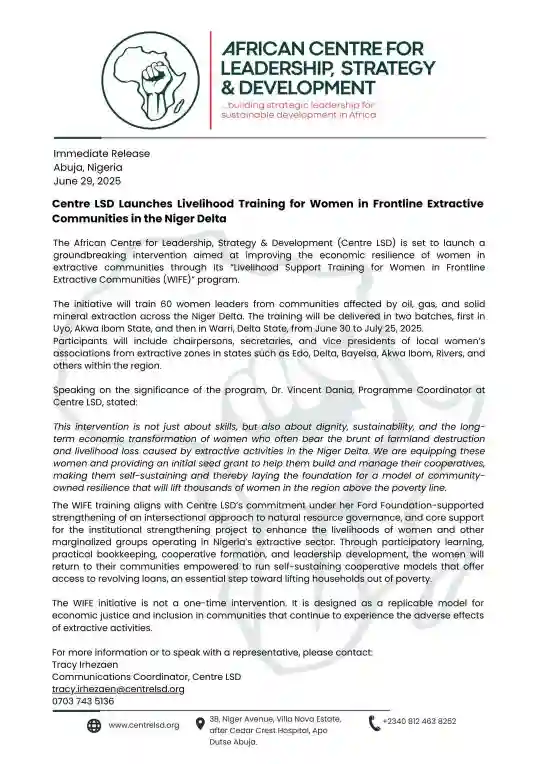Abuja, Nigeria – June 29, 2025 – The African Centre for Leadership, Strategy & Development (Centre LSD) has announced the official launch of its “Livelihood Support Training for Women in Frontline Extractive Communities (WIFE)” program, targeting women affected by extractive activities across the Niger Delta.
This new initiative aims to enhance economic empowerment and long-term financial stability for women leaders living in oil, gas, and solid mineral-producing communities. According to Centre LSD, the program will support 60 women leaders across the region. The training will take place in two phases: first in Uyo, Akwa Ibom State, and then in Warri, Delta State, running from June 30 to July 25, 2025.
Participants will include chairpersons, secretaries, and vice presidents of women’s associations from Edo, Delta, Bayelsa, Akwa Ibom, Rivers, and other affected states. The training is expected to build financial literacy, leadership skills, and cooperative development, offering tools needed to establish sustainable livelihoods.
Dr. Vincent Dania, Programme Coordinator at Centre LSD, emphasized the program’s broader impact. “This intervention is not just about skills, but also about dignity, sustainability, and the long-term economic transformation of women who often bear the brunt of farmland destruction and livelihood loss caused by extractive activities in the Niger Delta,” he said.
“We are equipping these women and providing an initial seed grant to help them build and manage their cooperatives, making them self-sustaining and thereby laying the foundation for a model of community-owned resilience that will lift thousands of women in the region above the poverty line,” Dr. Dania added.
The WIFE program forms part of Centre LSD’s wider engagement with natural resource governance, supported by the Ford Foundation. It focuses on enhancing women’s financial independence, promoting social inclusion, and improving access to microfinance through revolving loan systems.
Through hands-on learning, bookkeeping practices, and cooperative management, participants are expected to return to their communities with the skills to launch and sustain economic ventures. This is in response to growing concerns over poverty and displacement caused by extractive industries.
Centre LSD confirmed that WIFE is not a one-time event, but a long-term, replicable strategy for economic justice, aiming to serve as a model for other marginalized communities in Nigeria’s extractive sector.

